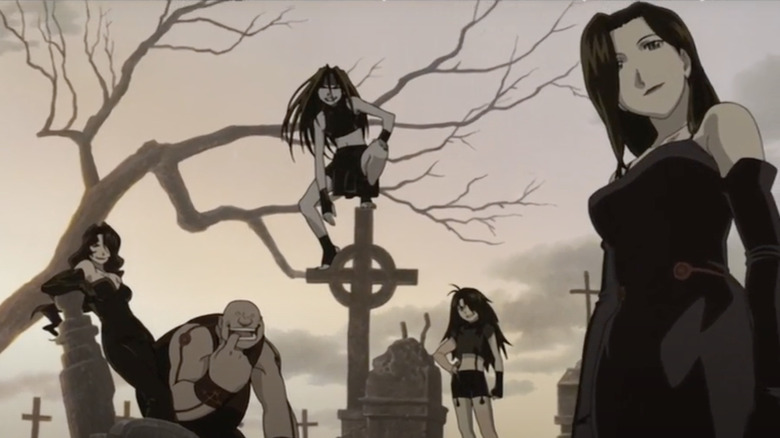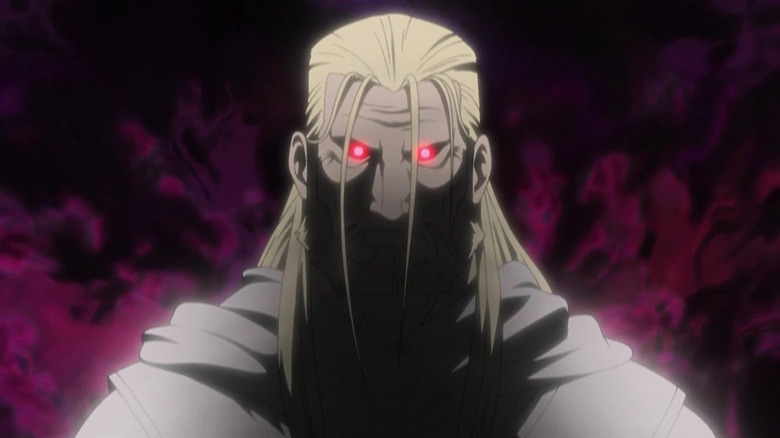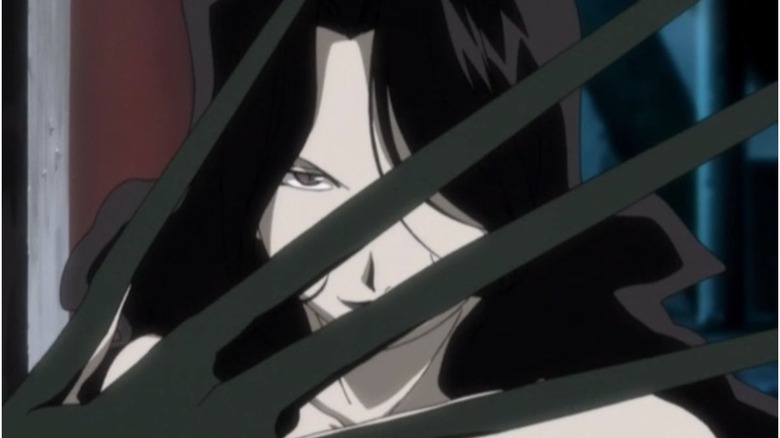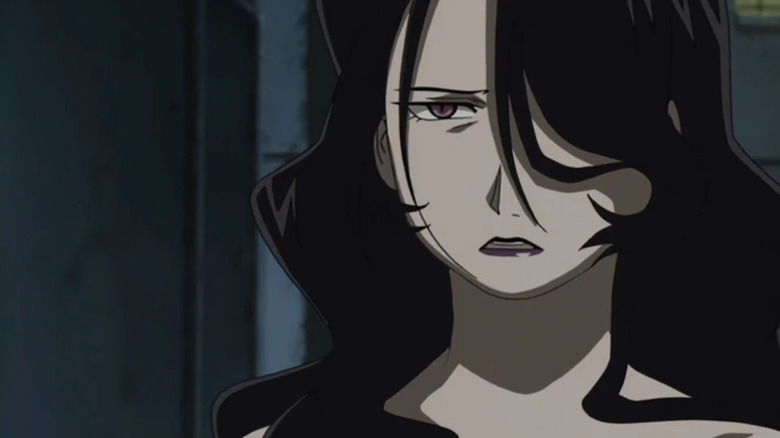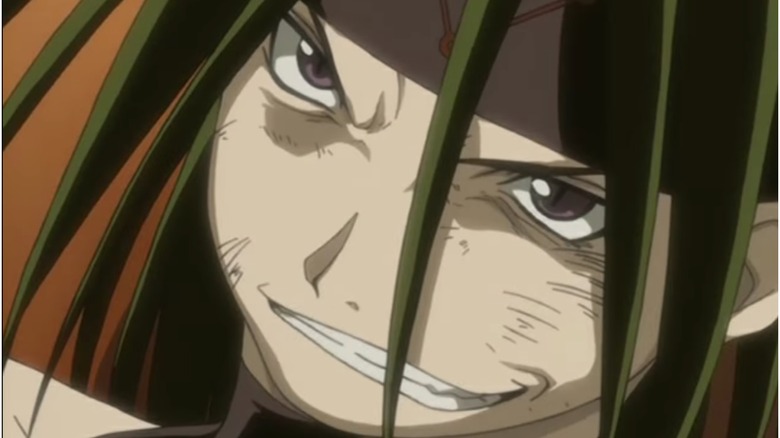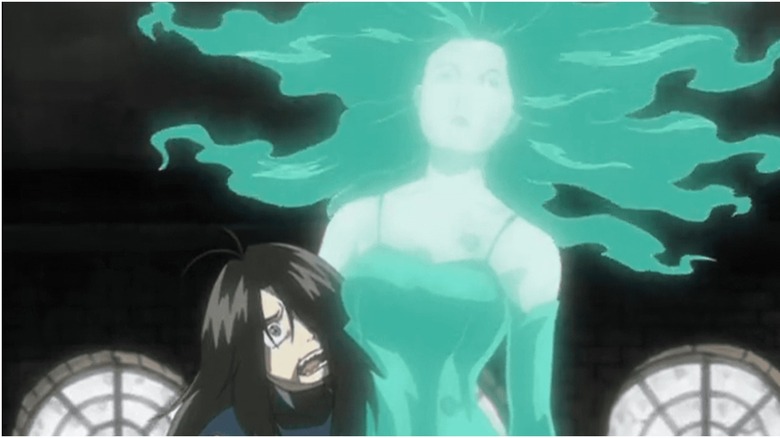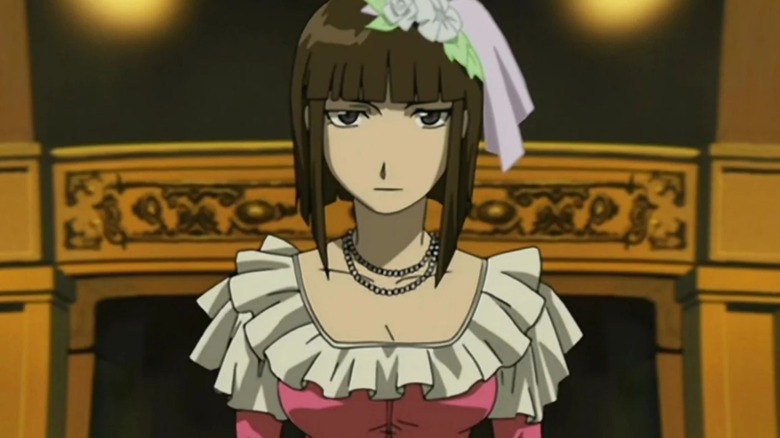2003's Fullmetal Alchemist Had Much More Compelling Villains Than Brotherhood
"Fullmetal Alchemist" is the story of Edward and Alphonse Elric, two brothers who tried to revive their mother and were punished for playing god. In alchemy, you must sacrifice something of equal value to gain anything, but what could equal a human soul? The brothers found out when they paid their toll. Ed lost his right arm and left leg, while Al lost his whole body; Ed bound his brother's soul to a suit of armor to keep him alive. From there, the brothers search for the legendary Philosopher's Stone to restore their bodies. First written as a manga by Hiromu Arakawa, the series has been adapted into anime twice.
At the risk of sounding like a cowardly centrist, I genuinely believe both "Fullmetal Alchemist" animes are well worth your time. Both succeed at their different goals. The manga-faithful "Fullmetal Alchemist: Brotherhood" is a pedal-to-the-medal action-adventure epic. The first anime adaptation, aired from 2003 to 2004 and simply titled "Fullmetal Alchemist," is a slow burn, not to mention darker, dramatic, and more thoughtful. Whereas "Brotherhood" equivocates on themes of religion and imperialism, 2003's "Fullmetal Alchemist" stands bold in condemning the evil of such institutions. I even find myself preferring some of the different directions in mythology that the first series took. Many of the changes I most like concern the series' villains, the Homunculi.
A group of alchemically-created beings, the Homunculi are each named for one of the Seven Deadly Sins and have superpowers that reflect their designated sin. The 2003 "FMA" offered a very different take on their collective origin and characterized them quite differently. These changes turned the Homunculi into more three-dimensional villains who better reflected the series' themes.
The sins of mankind
Let's begin this by comparing the different origins of the Homunculi. Now here's where I make a concession; the origin of Seven Deadly Sins naming motif is better explained in "Brotherhood." The main antagonist is the first Homunculus, whose goal is to become a perfect being. To that end, he cast off his own Pride, Lust, Greed, Envy, Sloth, Gluttony, and Wrath, shaping the resulting embodiments into a family of which he is the Father.
However, this also illuminates the comparative shallowness of the "Brotherhood" Homunculi compared to their 2003 brethren. As the literal embodiment of human sins, they have less depth and capacity for change. Even Greed's heel face turn is rooted in his fundamental avarice; he realizes it's not power he craves most of all, but friendship.
In 2003's "FMA," the changes between these Homunculi and their manga counterparts start to be unveiled when the characters meet Wrath, a childlike homunculus who has Ed's stolen limbs. In episode 31, appropriately titled "Sin," Wrath reveals the roots of his kind:
"Either out of love or foolish curiosity, human transmutations are attempted, and when these attempts all backfire, a different life is created. A being that has its own body and mind but no soul. That is how the damned are born! That is a Homunculus!"
I, for one, find this origin infinitely more compelling. It's much more Frankensteinian; alchemists create life but don't get what they bargained for. It also better ties the series together. Since the inciting incident is Ed and Al trying to defy death, the villains of their journey should be the consequences of such arrogance. Likewise, this backstory creates richer relationships between the heroes and the Homunculi because many of them turn out to be related.
Lust: Yearning to be human
The first Homunculus we meet is Lust, aka the Ultimate Spear; she's capable of extending her fingers into super-long, super-sharp talons to penetrate her foes (get it?). In "Brotherhood," she's also the first of the seven to be disposed of; lust is the most fleeting of the deadly sins, after all. Her fiery send-off in episode 19, "Death of the Undying," is a spectacular scene, but it exists to show off what a badass Roy Mustang is. "Brotherhood" Lust was a one-note villain who only contributed to the story by dying. 2003 Lust, on the other hand, is a longer-lasting and more complex character.
In episode 22, "Created Human," Ed guesses that she just wants the Philosopher's Stone to satisfy a god complex. Lust reveals it's quite the opposite: "I want to become a human." In life, Lust was a sickly Ishvalan woman. After she passed, her lover turned to alchemy (forbidden by his people's religion) to bring her back. Lust faintly remembers her old life, but only as a third-person observer. She wants to become human to reconnect with her old self and understand these memories.
This goal means that '03 Lust better lives up to her name. Lust is desire at its most painful, for it's often accompanied by a knowledge that we can never have what we crave. Dub actress Laura Bailey also gets to stretch her range; instead of just oscillating from sultry to sadistic then back again, she often sounds sad, even downright mournful.
Where do we go?
Episode 35, "Reunion of the Fallen," is a linchpin for Lust's character. She asks the questions that will define her for the rest of the series: "Where did I come from? Where will I go?"
Flashbacks reveal that Lust and Gluttony once came to a village suffering from a plague, where Lust taught a young man named Lujon how to use alchemy to cure the sickness. Of course, the Homunculi were the ones who started the plague; their goal was to give Lujon a taste of power so he would seek out the Philosopher's Stone. Lujon falls head over heels for his teacher. Lust develops a fondness for him too, if only because she sees the man she once loved in Lujon. Torn between her desire and obedience to her master so she may see her goal through, Lust embraces repression and lethally rejects Lujon, dismissing him as her "little mistake."
Lust's old lover turns out to have been the late brother of the show's antihero, Scar. Still, Scar denies that she's the woman he knew resurrected, reasoning the dead can never return. Indeed, Lust never gets her wish of becoming human — or does she? Scar's death severs Lust's last living link to her old life, but it only strengthens her yearning. She ultimately teams up with Ed, promising to help him defeat her brethren if he makes her human. She doesn't live long enough for either end of the bargain to be fulfilled.
As Wrath strikes her down, Lust asks one last time, "Where did I come from and where will I go when I die?" This time, she concludes, "Maybe all this time that is what I wanted: the freedom to find out." It's a grim ending for her character, but one perfectly in line with the series' theme that humanity and mortality are intertwined.
Envy: A prodigal son's jealously
Envy is the epitome of a love-to-hate villain. Ruthless yet hilarious, his shape-shifting is also the homunculus superpower that best reflects the assigned sin. When you envy someone, you want the things they have; Envy can take those things by literally becoming the people he's jealous of. No matter the version, Envy is the most memorable of the Homunculi. However, 2003 "FMA" infuses his character with pathos he lacked in "Brotherhood."
Like Lust, Envy begins to diverge from his manga counterpart in "Created Human." As he knocks an injured Ed to the ground, he glares down and, bile boiling in his voice, declares, "I can never forgive you, and there'll never be a time when I'm able to forgive you, for carrying that bastard's blood in your veins!"
It turns out that Ed and Al weren't the first ones in their family to attempt human transmutation. Their father, Hohenheim, had another son before them, one who died prematurely. Attempting to resurrect him, Hohenheim created the first Homunculus: Envy. Horrified by what he'd made, Hohenheim abandoned Envy. Now the Homunculus lives only to kill his father, a desire that only strengthened when he found out that he'd been replaced by the Elric brothers.
"Brotherhood" presented Envy as jealous of humanity's inner strength in their final moments, but it was revealed too late to really land. 2003 Envy's resentment of Hohenheim's favored sons is much more palpable. His true form even resembles his father and brothers, but he still prefers to inhabit his "adorable" green-haired and androgynous body. After all, envy is born of dissatisfaction with oneself. Like Lust, Envy's name better informs his character than in "Brotherhood."
Combine that with a sadistic cunning his impulsive "Brotherhood" self couldn't come near and a smooth, menacing dub performance by Wendy Powell, and you get Envy, the scariest villain in 2003's "FMA."
Sloth and Wrath: Sins of the heroes
Sloth hadn't been introduced in the manga yet when the first FMA anime aired. It turned out to be an underwhelming debut; Sloth was a slow-moving brute and the most inconsequential Homunculus. 2003 Sloth, on the other hand, was a masterstroke. A Homunculus made from water, Sloth turns out to be the product of Ed and Al transmuting their mother. Ed and Al are carrying the guilt of their past, but it's heavier in this version because the Elrics bear some responsibility for the Homunculi's actions. Ed outright calls Sloth, "[Mine and Al's] sin and our burden to bear."
Sloth often addresses Elrics as their mother, and this tears them apart; Ed is fervent that she must be destroyed, while Al is convinced they can reawaken her human self. Sloth ultimately reveals that, like Lust, she remembers her human life, but she regards these memories as chains. To her, Trisha Elric is a separate person whose memories are corrupting her and the only way to break the link is to kill Trisha's sons. Ed beats her to the punch, transmuting her liquid body into ethanol. As she evaporates, transparent and green as a ghost, Sloth's human side asserts herself and asks the brothers to watch over each other without any insincerity.
The sins of the heroes don't end there. In both versions of the story, the Elrics' teacher Izumi Curtis is revealed to have attempted human transmutation of her stillborn son. The 2003 anime likewise ties this to the Homunculi and makes her the mother of Wrath.
In "Brotherhood," Ed discovers that what he and Al made wasn't their mother recreated but just a mess of malformed body parts. The brothers and Izumi are relieved they didn't kill their loved ones a second time. This is an underwhelming development; it lets these characters off the hook for their actions instead of forcing them to confront the consequences.
Dante: Equivalent exchange is a lie
"Fullmetal Alchemist" opens with the Elric brothers exposing the false prophet Father Cornello. In the last stretch of the series, the tables are turned and it's Ed's faith that is shattered.
A stand-in for the absent Father, Dante is the leader of the Homunculi. In a past life, she was Hohenheim's lover and the mother of the boy who'd inspire Envy. Now, she seeks the Philosopher's Stone to become immortal. What makes Dante a compelling villain is how she mirrors the Elric brothers. Like Ed and Al once did, Dante seeks to defy death, but for purely selfish reasons. She also rejects their guiding philosophy of Equivalent Exchange. While sacrifice coming with gain is true in Alchemy, the world as a whole is far less fair. Dante dismisses equivalence as:
"A beautiful story told to comfort the oppressed and make children do their lessons. The truth is that the law of equivalent exchange is a lie... No matter how hard you work; when you die, you die. Some spend their entire life trying to scratch their way to the top and still die in poverty, while others are born into wealth without ever lifting an arm. It's a cruel and random world, but the chaos is all so beautiful."
Faith is something we hold onto so world's indifference seems tolerable. Where the heroes disagree is that this means we must fall into despair and nihilism. As Roy Mustang says in the finale, "the world's not perfect, but it's there for us, trying the best it can. That's what makes it so damn beautiful." Al further says he no longer thinks of Equivalent Exchange as a law, but as a promise. The world is inherently imperfect, so it's up to us to improve it as much as we can.
